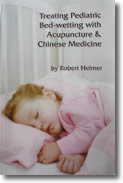Treating Pediatric Bed-Wetting with Acupuncture & Chinese Medicine
By Robert Helmer
A Book Review
 Bed-Wetting, or Primary Nocturnal Enuresis (PNE), is a very common pediatric problem, though one that most families do not like to discuss openly. It is estimated that as many as 20% of five year-olds, 10% of six year-olds and even 1% of 15 year-olds experience an inability to control night time urination. While there may be a medical condition that is causing the problem, and every child should be tested to rule out such conditions, only 1-3% of enuresis cases have an organic cause that is identifiable by Western medical tests.
Bed-Wetting, or Primary Nocturnal Enuresis (PNE), is a very common pediatric problem, though one that most families do not like to discuss openly. It is estimated that as many as 20% of five year-olds, 10% of six year-olds and even 1% of 15 year-olds experience an inability to control night time urination. While there may be a medical condition that is causing the problem, and every child should be tested to rule out such conditions, only 1-3% of enuresis cases have an organic cause that is identifiable by Western medical tests.
Once Western medicine rules out a physical problem, treatment options consist of counseling, motivational therapy, behavioral therapy such as using alarm devices to wake the child, and drug therapy. Several medications are available to attempt to increase bladder capacity or to reduce the amount of urine produced by the body. None of the medications are a cure for enuresis and most of these medications have potential major side effects. Most doctors will not prescribe medications for children until the age of seven. Unfortunately, the social stigma that we associate with bed-wetting may have already had a huge negative impact on the self-esteem of these children.
Traditional Chinese Medicine (TCM), views enuresis as a disorder of water metabolism. In TCM, the three organs that control water metabolism are the Lungs, the Spleen and the Kidneys. Enuresis is usually explained in TCM as a deficiency of the energy of one or more of these organs. The Heart and the Liver may also play a part. Mr. Helmer does a good job of explaining pattern differentiation that would be easily understood by trained acupuncturists.
The majority of Mr. Helmer’s book is devoted to documenting scores of research protocols that have been conducted in China. He provides dozens of case histories. He also provides a sample in-take form that would be helpful to conclude the TCM pattern differentiation.
The good news is that the majority of these protocols have very high success rates in curing or improving enuresis. Many TCM treatment modalities have proven to be effective. Body acupuncture, auricular acupuncture or acupressure, moxibustion, tuina (TCM massage), internally administered herbal medicine or externally applied herbal medicine, magnetotherapy and cupping have all proven to be effective either alone or in combination.
The study that most impressed me, consisted of applying an herbal paste of scallions and sulfur to the navel area at night-time. All 132 patients in the study were completely cured in 2-4 days and there was no reoccurrence of enuresis two years later. Simple, non-invasive, and effective. How wonderful for these children!
Like most TCM research, treatment was given more frequently than is practical or affordable in this country. Usually treatment was given daily, or every other day, for a week. If necessary, the patient was given a day off, and then the course was repeated. But many of the techniques could easily be taught to parents by compassionate practitioners of TCM. Auricular acupressure, moxibustion and tuina could easily be administered by trained parents and could be the answer for many of these children.
Hats off to Mr. Helmer for providing a host of TCM options to treat enuresis!
About the Author:
Joyce Marley is a licensed acupuncturist that provides acupuncture therapy in New Hartford, NY. She writes alternative health articles about acupuncture and Oriental medicine.



